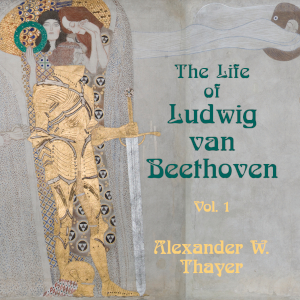The delightful tale of "le petit Santos" as he dances through the sky above the City of Light at the dawn of the aerial age.A note to the listener: Throughout this story the author makes several references to helpful figures and illustrations. These may be found upon the corresponding pages in the Project Gutenberg e-book. (Summary by Scott Danneker)
26 episodes

In 1813, the year that he was appointed Poet Laureate, Robert Southey published "The Life of Nelson". Horatio, Lord Viscount Nelson was Britain's greatest Naval hero who had been killed during the Battle of Trafalgar in 1805 during which he had issued that famous message to the fleet; "England expects that every man will do his duty."In a preface to the first edition, Southey wrote: "Many Lives of Nelson have been written; one is yet wanting, clear and concise enough to become a manual for the young sailor, which he may carry about with him till he has treasured it up for example in his memory and in his heart. In attempting such a work I shall write the eulogy of our great national hero, for the best eulogy of NELSON is the faithful history of his actions, and the best history must be that which shall relate them most perspicuously."
Nelson's example as a seaman was considered so exemplary and Southey's biography so laudable that the American Government gave a copy of the book to every officer and seaman in their fleet. (Summary by Noel Badrian)
23 episodes
This is a short life of Henry John Temple (1784-1865), Third Viscount Palmerston, Great Britain's affable, able, and always available Foreign Secretary, Home Secretary, and Prime Minister. Sanders writes that by 1841 Palmerston "had raised the prestige of England throughout Europe to a height which it had not occupied since Waterloo. He created Belgium, saved Portugal and Spain from absolutism, rescued Turkey from Russia, and the highway to India from France." (Pamela Nagami)
30 episodes
L.M. Montgomery's autobiography highlighting her childhood and early literary career. Published in 1917 after she had written several novels. - Summary by Carolyn Agee
10 episodes
This 1906 collection of memories of Oscar Wilde is by friends. Wilde said that his genius was his life; only his talent was in his works. (Summary by david wales)
4 episodes
The story of Sir Walter Raleigh from his boyhood days to his exploits in Ireland and his unexpected entry into the court of Queen Elizabeth. We travel with him as he pursues the ships of the Spanish Armada and makes voyages to the New World in search of gold and lands to settle. We learn how he introduced potatoes and tobacco to England and Ireland. We hear how he is relegated to the Tower of London where he spends the last years of his life. The Story of Sir Walter Raleigh is a wonderful adventure. (Summary by johnb2)
11 episodes
It has been the object of the writer to make each of these “famous assassinations” the central scene of a picture in which the political, religious, or national features of the epoch in which the assassination occurred are portrayed with historical fidelity and strict impartiality…. Only those assassinations have been included which either had an important and political bearing on the world, or on the nation immediately affected, or which left a profound, and, it would seem, indelible impression on the imagination of contemporaries and posterity. - Summary by Book Preface
26 episodes
This is a 1905 memoir of one great litterateur’s latter days written by another great litterateur. This recording omits the numerous footnotes and two letters in French untranslated by the translator. -Summary by david wales
5 episodes
Sojourner Truth (born Isabella Baumfree) was born into slavery in 1797 (or thereabouts) in Swartekill, Ulster County, New York. This narrative, as told by Sojourner Truth to her friend Olive Gilbert, recounts to the best of her recollection what she and her family endured while they were the legal property of other human beings. These life experiences served as the catalysts for her becoming, in her later years, an outspoken abolutionist and women's rights activist. Her forgiving attitude toward those who once treated her and her loved ones with such cruelty is an example for all who would aspire to heal and move on from traumatizing life experiences. The voice of Olive Gilbert comes through in this narrative, and together, she and Sojourner Truth build a compelling case against slavery. - Summary by Holly Jenson
31 episodes
The contents of these volumes of 'Celebrated Crimes', as well as the motives which led to their inception, are unique. They are a series of stories based upon historical records, from the pen of Alexandre Dumas, pere, when he was not "the elder," nor yet the author of D'Artagnan or Monte Cristo, but was a rising young dramatist and a lion in the literary set and world of fashion.
The third volume is devoted to the story of Mary Queen of Scots, another woman who suffered a violent death, and around whose name an endless controversy has waged. Dumas goes carefully into the dubious episodes of her stormy career, but does not allow these to blind his sympathy for her fate. Mary, it should be remembered, was closely allied to France by education and marriage, and the French never forgave Elizabeth the part she played in the tragedy. ( From the introduction)
11 episodes
A history of Florence Nightingale (1820-1910), the founder of modern nursing. Here's the definitive biography, gleaned from a lifetime of her notes, letters and writings, that goes way beyond the mere legend of "The Lady With The Lamp", and the "Founder Of Modern Nursing". This well written saga covers the vastly more expanded story of her development into an intelligent woman with a high purpose, her social standing and family connections that opened many doors for her, her extensive work after the Crimean War working with governments to develop better health care delivery systems to the indigent in England and in India, and her voluminous writings on numerous topics. Volume 2 recounts her life from 1861 through her death in 1910. (Summary by Michele Fry)
38 episodes
Enos Mills (1870-1922 ), naturalist and conservationist, was instrumental in the creation of Rocky Mountain National Park. Like his mentor John Muir, Mills was an intrepid solitary high country rambler, as well as an accomplished Colorado mountain guide. There are mountain tales aplenty in "Adventures of a Nature Guide." At one point, Mills climbs Long's Peak alone in a gale with winds topping 170 mph., "carried away with the wild, elemental eloquence of the storm." Near the summit, the wind is so fierce he cannot make headway, so he concludes to "reverse ends." "Putting a shoulder against a rock point, I allowed the wind to push my legs around. This . . . enabled me to brace effectively with my feet, and also to hang on more securely with my hands. . . There was no climbing; the wind sucked, dragged, pushed, and floated me ever upward." Summary by Sue Anderson.
18 episodes
Madame Germaine de Staël (1766-1817) was the daughter of the Swiss banker and statesman, Jacques Necker. Her mother hosted a popular Paris salon where intellectuals gathered, many of whom contributed to the education of the brilliant girl. After his fall from political power in 1781, her still-wealthy father was able to marry Germaine to Baron Erik Magnus Staël von Holstein, but the couple separated in 1797. A successful novelist, Madame de Staël was a fervent defender of J.J. Rousseau and of the ideals of the French Revolution. In 1792 she was forced to flee to England where she continued to socialize with such French luminaries as Charles Maurice de Talleyrand. After the death of Robespierre in 1794, she returned to Paris where she met and came to oppose Napoleon. (Pamela Nagami)
24 episodes
Nominally an autobiography, Biographia Literaria ranges widely across the realms of philosophy, poetry and memoir, in Coleridge's trademark discursive style, providing a living glimpse of the great talker, the man who could hold his contemporaries in thrall for hours with his dazzling conversation, and who was famously described as the last man "to have read everything". Summary by Nicole Lee.
28 episodes
This is the fourth volume of Alexandre Dumas' studies of celebrated crimes and their perpetrators. This volume is concerned with the story of Karl Ludwig Sand, who stabbed August von Kotzebue to death in 1819. August von Kotzebue had been a prominent dramatist, a student of Musäus, whose royalist and conservative writings ultimately led to his assassination by a member of a revolutionary liberal Burschenschaft. - Summary by Carolin
4 episodes
Louis Pasteur (1822-1895) famously said, "In the fields of observation chance favors only the prepared mind." Pasteur brought to the study of chemistry, microbiology, and applied immunology, a mind open, innovative, and insightful. Born of peasant stock in the French Jura, he worked with dogged determination all his life and often in the face of strenuous opposition. Through an unbroken succession of rigorously designed and meticulously performed experiments, Pasteur developed veterinary vaccines and halted grievous losses in the French wine, silk, and dairy industries. He provided the crucial experimental support for the germ theory of disease which enabled Joseph Lister and others to prevent infections in surgical patients and in new mothers. During the development of the vaccine against rabies, Pasteur and his colleagues often risked their own lives, but they delivered humankind from the terror of this agonizing and almost always fatal illness. (Pamela Nagami, M.D.)
15 episodes
Abraham Lincoln: A History is an 1890 ten-volume account of the life and times of Abraham Lincoln, written by John Nicolay and John Hay, who were his personal secretaries during the American Civil War. Volume 5 chronicles Lincoln's life from November 1861 through August 1862. (Summary adapted from wikipedia by Ann Boulais)
24 episodes
After the Civil War, Harriet and her husband Charles bought an Orange Plantation in Mandarin, on the upper east coast of Florida, where they lived during the winter months. Over the years they expanded their cottage to accommodate many guests (now a museum open to the public). They opened schools to educate and churches to care for the recently freed negros pouring into Florida seeking refuge and opportunity. These charming essays, each describing a largely undeveloped rural land, became one of the first travel guides written about Florida and stimulated the first boom of tourism and residential development to that area. Stow describes its waterways, flora and fauna, the generosity of the people, the lush abundance of flowers, farmer's efforts to develop crops, Negro relations with whites, correspondence with famous persons, etc. - Summary by Michele Fry
20 episodes
The life and accomplishments of England's sole title holder of "The Great." King Alfred defended England from Viking invasions and ushered in an era of learning and progress for the British Isles. Summary by Ryan Cherrick.
14 episodes
Margaret of Angoulême, Queen of Navarre (Marguerite de Navarre), (1492-1549), was the sister of Francis I, King of France. She was highly-educated and was courted by the future Henry VIII of England. However, at the age of seventeen, she was married by royal decree to the untutored dolt, Charles IV of Alençon. After his death she wed Henry II of Navarre by whom she had a daughter (the mother of the future Henry IV of France) and a son, who died in infancy. The author takes us with Margaret on her perilous journey over the Pyrenees to Spain to attempt to free her brother, Francis, held captive by the Holy Roman Emperor. Margaret's support for the first stirrings of the Reformation in France alarmed the Catholic conservatives of the Sorbonne. Her cycle of short stories, the "Heptameron," is still read and enjoyed today. (Pamela Nagami)
25 episodes
Dumas's play talks of American Naval Hero John Paul Jones's romantic entanglements and affairs of honor ashore in France. He later converted it to a novel. - Summary by ToddHW
Cast list:
The Marquis D'Auray: Amy Gramour
The Marchioness, his wife: Sonia
Count Emanuel, their child: Tomas Peter
Margaret, their child: Leanne Yau
Baron De Lectoure: Nemo
Paul Jones: ToddHW
Louis Achard: Thomas A. Copeland
Mr. De La Jarry: Roger Melin
Mr. De Nozay: RecordingPerson
Notary: Zames Curran
Laffeuille, valet to the Marchioness: Son of the Exiles
Jasmin, valet to Emanuel: Eva Davis
Stage Directions: Sandra Schmit
Edited by: ToddHW
5 episodes
This volume, published in 1919 by the American Women's Baptist Home Mission Society, opens with an introduction spelling out the important work done by African American women. It speaks both to the "invisible work" of as mothers and wives, and the work done outside the homes in all sorts of industries, as well as in medicine, education, and arts. In addition, it contains short biographies of five brave, inspiring women. - Summary by kathrinee
6 episodes
This book, written by the famous hobo and author, Leon Ray Livingston aka A-No. 1, is built on his own experiences on the road. The first chapter of the book sets up a framing narrative, where Canada Joe promises to tell a story which is not "the same, old, time-worn tales of how slick hoboes beat trains, nor fabled romance concerning harmless wanderlusters, nor jokes at the expense of the poor but honest man in search of legitimate employment, but I shall relate to you a rarely strange story that will stir your hearts to their innermost depths and will cause you to shudder at the villainy of certain human beings, who, like vultures seeking carrion, hunt for other people's sons with the intention of turning them into tramps, beggars, drunkards and criminals--into despised outcasts." Come listen to his story! - Summary by kathrinee.
16 episodes
Elbert Hubbard describes the homes of authors, poets, social reformers and other prestigious people, reflecting on how their surroundings may have influenced them. These short essays are part biography and part pontification of Hubbard's opinion of the subject and their oeuvre.
In this volume he reflects on the lives of American Statesmen, presidents like George Washington and Abraham Lincoln, but also others like Alexander Hamilton, Henry Clay, or William H. Seward. (Summary by Lucy Perry, adapted by Ava)
This is Volume 3 in a series of 14 books.
25 episodes

Emily Brontë (1818-1848) is best known for her only novel, "Wuthering Heights." She was born in Yorkshire, northern England, where her father was an Anglican curate. When Brontë was three years old her mother died of cancer. At the age of six she joined her three sisters briefly at the Clergy Daughters' School, where privations and abuse contributed to the deaths of two of them. Her elder sister, Charlotte, immortalized this terrible place in "Jane Eyre." In 1846 Emily Brontë, under the pseudonym Ellis Bell, published a selection of her poetry. In 1847 appeared her dark, gothic novel, "Wuthering Heights," with its Byronic anti-hero, Heathcliff. Brontë was shy, even reclusive, and never married. In the fall of 1848 she fell ill with inflammation of the lungs, probably due to rapidly-progressive tuberculosis, and died in December of that year, aged twenty-nine. This is a short biography of Brontë written by the British poet, novelist, and critic, Agnes Mary Frances Robinson (1857-1944). (Pamela Nagami)
20 episodes
The results of a survey undertaken by Galton to learn more about individual differences and similarities between the "pre-eminent" men of his time. Brief biographical information, biometric data and extensive quotations have been compiled and presented. Summary by niobium.
8 episodes
Abraham Lincoln: A History is an 1890 ten-volume account of the life and times of Abraham Lincoln, written by John Nicolay and John Hay, who were his personal secretaries during the American Civil War. Volume 6 chronicles Lincoln's life in early 1862. (Summary adapted from wikipedia by Ann Boulais)
21 episodes
Lady Jane Grey was an English noblewoman, great-granddaughter of Henry VII. As her cousin, Edward VI, lay on his death-bed, he nominated her as his successor to the English crown ahead of his half-sisters Mary and Elizabeth. Jane's reign lasted a mere nine days, before she was convicted of treason and imprisoned in the Tower of London. Often considered one of the most romantic characters of royal history, Taylor gives us a full biography of the Nine Day Queen. - Summary by Lynne Thompson
23 episodes
This story details the many crimes (attempted rape, assault, filicide, etc.) surrounding a significant historical confrontation between a fisherman from the island of Nisida, named Gabriel, and the Italian Prince of Brancaleone. Dumas notes that "the details of this case are recorded in the archives of the Criminal Court at Naples." - Summary by jvanstan
3 episodes

Short Biographies of some of the most influential engineers who developed the modern manufacturing methods behind the Industrial Revolution.
Engineers and designers tend to be fairly anonymous figures in history – content to make things rather than write about them. At the time Smiles wrote “Industrial Biography” the whole of British society was undergoing massive changes driven by developments in the High Technology of the day – Mechanical Engineering.
Much of the knowledge we have of the brilliant mechanical engineers who developed the iron and machine tools of the nineteenth century was gathered and recorded by Smiles from the men themselves and from their students. Without Bramah, Maudslay, Nasmyth , and others Brunel would not have been able to build his railways, bridges and steamships. And many of their machine tools are still in use 200 years later: my own lathe looks very similar to one made by Maudslay in 1800 and almost identical to Whitworth lathes from the 1830s.
Smiles’ most famous work is “Self Help” published in 1859: the book that defined the Liberal Victorian response to the poor. In "Industrial Biography", written only four years later, the virtues of thrift, hard work, and self-improvement are woven through the stories of the great mechanical engineers, most of whom raised themselves from very humble beginnings. In some ways Industrial Biography and the other engineering biographies published by Smiles can be seen as examples to illustrate “Self Help”. (Summary by Clive Catterall)
23 episodes
Richard Neville, 16th Earl of Warwick (1428-1471), wealthy and powerful peer of England, was one of the leaders of the Wars of the Roses (1455-1487). He joined Richard, Duke of York in opposing the ineffectual and often incapacitated Lancastrian king, Henry VI. Falling out with York's son, King Edward IV, he switched sides and joined forces with Henry's exiled queen, Margaret of Anjou, but was killed at the Battle of Barnet. In this short biography, the British military historian, Charles Oman (1860-1946) brings to life a consummate medieval warrior, who was also a politician ahead of his time.. - Summary by Pamela Nagami
17 episodes
Phineas Pett was a Master Shipbuilder from one of England's greatest shipbuilding families of the fifteenth and sixteenth centuries and kept a journal of his experiences and thoughts at this important and turbulent time in the industry. Although some pages were damaged or lost, the diary was transcribed by Samuel Pepys and preserved in the British Library. It was edited and published in the form of an autobiography by William Gordon Perrin of The Council of the Navy Records Society in 1918. - Summary by Lynne Thompson
21 episodes
The Lives of the Queens of England is a multi-volumed work attributed to Agnes Strickland, though it was mostly researched and written by her sister Elisabeth. These volumes give biographies of the queens of England from the Norman Conquest in 1066. Although by today's standards, it is not seen as a very scholarly work, the Stricklands used many sources that had not been used before.Volume eight includes the biographies of Henrietta Maria and Catharine of Braganza. (Summary by Ann Boulais)
33 episodes
These biographical essays of (mostly) British subjects were written in 1907-1908 for The Daily News newspaper and reflect their subjects as seen before the great cataclysm of World War I. Gardiner was a British newspaper editor, journalist, and author. His essays were and are highly regarded. - Summary by David Wales
41 episodes
Written for the centenary of Jane Austen's death, W. H. Helm reflects poetically on the timelessness of her work: the must of age has not settled on her books. The lavender may lie between their pages, but it is still sweet. Helm briefly surveys Jane Austen's influences, literary contemporaries and themes. He is particularly interested in her ideas and characters, and his short book is fully of pithy quotes encapsulating "the best of Jane Austen". Summary by Beth Thomas
7 episodes
Memoirs of General George Brinton McClellan, commanding general of the Army of the Potomac during the early years of the American Civil War. The work covers the time that McClellan commanded the Army of the Potomac, including the Peninsula Campaign, the Seven Days' Battles, and the Battle of Antietam.
48 episodes
This little book by the British military historian, Charles Oman, begins with the accession of the warrior king, Edward III, to the English throne in 1327 and ends with the downfall of Richard III at Bosworth Field in 1485. By carrying the story of the Hundred Years' War through the Wars of the Roses, Oman portrays this era of battle and plague within the larger context of the dynastic struggles and civil wars which destabilized England and left France vulnerable to invasion and conquest. Summary by Pamela Nagami.
14 episodes

Arthur Wellesley, 1st Duke of Wellington, (1769-1852), was born in Dublin, the younger son of an Irish Protestant aristocrat. He served with his brother in India and rose to prominence during the Napoleonic Wars in the Peninsular Campaign. As a youth, his mother saw little promise in him, but Wellesley was an early riser and a hard worker, inured to the harsh life of the army camp, and conscientious in his knowledge of terrain and of defensive tactics. He famously commanded the allied forces at the final defeat of Napoleon at Waterloo, but the two men never actually met. Although a staunch conservative, as prime minister in 1829, he was persuaded by Robert Peel to approve the long-overdue Catholic Relief Act. The journalist, George Hooper, penned this lively little biography in 1889, when he wrote that there were still many people alive who could "cherish the recollection of the silver-haired veteran, wearing a blue coat and white waistcoat and trousers, riding or walking through the streets, or painfully listening with one hand to his best ear, in the House of Lords." (Pamela Nagami)
17 episodes
Early biography of Charles Dickens published just 17 years after Dickens' death. Summary by Colleen McMahon
13 episodes
In this 1916 work, Albert Payson Terhune introduces twelve immensely influential women, whose actions influenced world history. Terhune chooses well-known figures whose stories are as much myth as history, like Cleopatra and Helen of Troy, artists such as George Sand, and a number of ladies whose names are not so well-known today, because their work was not immediately visible to the uninitiated. All stories will be interested to the modern feminist, and each reader and listener should be able to find a personal heroine among these select twelve. - Summary by Carolin
13 episodes
This slim volume by the Oxford University lecturer, George Henry Wakeling, deals with the period in British history from the reign of King James I through the death of Queen Anne. The story begins with England, transformed by the Protestant Reformation and keen to confront Catholic Spain, but burdened by a monarch unequal to national ambitions. Wakeling portrays the subsequent battles for dominance between the contending Protestant sects and chronicles the struggle for sovereignty between the British Crown and the emerging power of Parliament. - Summary by Pamela Nagami
10 episodes
Abraham Lincoln: A History is an 1890 ten-volume account of the life and times of Abraham Lincoln, written by John Nicolay and John Hay, who were his personal secretaries during the American Civil War. Volume 7 chronicles Lincoln's life from 1862, including the major battles in the American Civil War that year. (Summary adapted from wikipedia by Ann Boulais)
17 episodes
Sergeant Sullivan tells the story of his life as a Texas Ranger for 12 incredible years in the late 1800s. (Summary by Will Nuessle)
10 episodes
A biographical summary of the pre-eminent men of Britain grouped by profession. The extensive survey draws from information including college graduation, reputation during career, fellowships, and even known relatives. Includes discussions on findings and observations as well as referenced appendices. - Summary by Leon Harvey
24 episodes
Eleanor Constance Lodge, (1869-1936), was the first woman to receive a Doctorate of Letters from the University of Oxford. In this short survey, the 180 years between 1273 and 1453 are characterized as a period of "transition--a time in which medieval characteristics were decaying and modern characteristics were growing up." This is the age of Joan of Arc, of the recovery of Spain from the Moors, of the failed Crusades of the Teutonic Knights, and of the union of Poland and Lithuania under the strong house of Jagello. The Swiss Republic rose, while schism divided the Papacy and the German states. And all the while the European powers were wrangling among themselves, the Ottoman Turks were advancing across the eastern Mediterranean. The book closes with the fall of Constantinople before the overwhelming assault by land and sea of the great general, Mehmed the Conqueror, which marked the end, after 1500 years, of the Eastern Roman Empire. - Summary by Pamela Nagami
27 episodes
Abraham Lincoln: A History is an 1890 ten-volume account of the life and times of Abraham Lincoln, written by John Nicolay and John Hay, who were his personal secretaries during the American Civil War. Volume 8 chronicles Lincoln's life from 1862 to 1863. (Summary adapted from wikipedia by Ann Boulais)
20 episodes
After years of telling these stories to his grandchildren, Foster was prevailed on to write them down for future generations. Rather than rely on his memory, he conducted research for accuracy. He served as a colonel for the Union Army during the American Civil War and later went on to serve as U.S. Secretary of State under President Benjamin Harrison. - Summary by Lynne Thompson
12 episodes
Ali Tepeleni, Pacha of Janina, rose to power during the early 1800s in one of the Ottoman Empire’s most unruly territories (Albania). His ferocious imposition of will was limitless, earning him the sobriquet of “the Lion of Janina.” As the mauling and murder of innocents sustains the lion, so did it sustain Ali Pacha’s rule. Thus, the range of celebrated crimes that Dumas describes in this essay are as vast as Ali Pacha’s ambition – an ambition rooted in his mother’s callous advice that “success justified everything, and everything is permissible to him who has the power to do it.” - Summary by jvanstan
11 episodes
Gustav Kobbe was a German/US music critic who worked at the time of Liszt and Wagner in particular, and was clearly in the Wagnerian rather than the Brahms camp. His unusual style of writing and his strongly romantic take on the loves of these seven composers makes for entertaining listening, even though his facts and opinions may differ from more academic writers and biographers of these composers. Each composer occupies a section or chapter, with Wagner getting the fuller account in terms of length. In fact Gustav Kobbe claims he knew Liszt and Wagner as well as Cosima Wagner - so this must be quite original and authoritative. The 19C period and its atmosphere is conveyed by Kobbe's unusual sentence construction and reads more like story telling rather than a written work. ( Peter Thomlinson)
7 episodes
The first of three volumes of the first scholarly biography of Ludwig van Beethoven. Covers the years 1770-1802. - Summary by Zain Solinski
26 episodes

















































